I met Djindic before he became “the” Djindic. He jumped over the office table and shook my hand when our mutual friend introduced me as a feminist, ironically. I remember, too, that afterwards, whenever he would meet me, he would shake my hand in a feminist leftist way — but not ironically, on the contrary, seriously amused.
Later on, when he became public domain, we no longer met privately — only randomly. He was the most important Serbian politician of the 20 century, who managed to step into the 21st, who toppled Milosevic, who was eventually killed by state mafia resisting his progressive steps toward a modern Serbia.
– History marches with big steps, he once said, when his daughter was just born and we sat at his place in his small apartment. He was regretting his lack of time for a private life.
– You are behaving like a granny, you know, he told me on one occasion when I was worrying about one unpaid check in the midst of a calamitous economic fall — a criminal state robbing it’s citizens of their bank accounts. I wasn’t offended by this remark — it made me come to my senses. The state’s elderly pensioners were famous for voting for Milosevic, while I didn’t even have a real job.
Once we spoke about the future of Serbia and he said: anyone with a grain of sense would leave Serbia. There is no future here.
He didn’t leave. Those who listened to him carefully didn’t leave either.
A couple of times I really got angry with his words and deeds: I was present at a uncomfortable discussion about his visit to Pale and the Bosnian Serbian leaders now indicted as war criminals in Hague… Then again, I was angry when I was the victim of street violence in the gay parade in 2001, and Djindjic declared that it was “too early” for such political issues.
While I am writing this, in my mind I have all the time the day of his murder. A steamy hot day, nervous; I am rushing to the ministry of health to do some paperwork. I am crossing the Nemanjina street, and the parallel one behind the government : I see the parking lot where the assassination is going to happen, I see the guard stepping out of his booth with burek in his hand. I want to cross the parking lot in order to reach my destination faster, he stops me: You can’t do this, this is the building of the government. I haven’t the foggiest but I remember how this parking lot seems very informal and unguarded. It’s absurd that I cannot cross it.
I remember the empty street where the killer Zvezdan was parked in waiting. I remember entering the department of health in time, that they are calling out my name to get my papers and that my cell phone is ringing. In tears my lawyer is screaming: they killed him, they killed Djindic… I am throwing the papers and running back home…
I am switching on the TV, phoning everybody I know and of course I see, I know, oh I am getting it all very well. Dark fear is rising from my guts. When my mother died, I said to my cousin: I will ask my mom where the family jewels are so we can keep them for our children. I felt something similar on March 12, 2003: let us ask Djindjic just a couple of things more, even through a TV screen, before they bury him forever.
Then the collective tears follow: of his crew, of the government, that terrible burial in the ugliest church in the Balkans, then the action Sword to get all the criminals involved in his murder, then the bumper stickers action all over Serbia STOP THE CRIME: endless conversations with citizens who are willing to help in whatever may be necessary. In particular I remember one student whom I met at midnight on the street: she snatched all of my bumper stickers and said, I will do it in my university, you go to sleep. Then she burst in tears.
Then commenced the slow but certain restoration of Milosevic’s friends, visible and invisible. I wasn’t politically aware altogether of what a desperate situation his death had brought to us.
The last awareness I had was terrible: in the court in Belgrade a couple of months ago, Bugsy, the protected witness, is muttering some half truths about the murder. Then Zvezdan the killer stands up as a winner, the guy who killed his country’s president out of patriotism and who bequeathed the gun to the museum of history.
I was sitting next to an unknown woman who seems to be in court just to warm her bones, a couple of Bugsy’s friends, me, and that’s it.
Djindic was a very popular man. Even people who didn’t agree with him liked him. His enemies thought well of him. His murderers, too.
Where are these people now, what are they thinking, what about their future and conscience? I don’t think it is a matter of a democratic party, his family. Not even of politicians and philosophers who are swearing on his grave using his words. It is a matter of all of us who gained a part of our civil identity in Serbia thanks to his political courage.
We can say all we want to say, in favor or against his politics, but thanks to him, history advanced in big steps forward — and without him, history limps and crawls back into the dark.
 East Journal Quotidiano di politica internazionale
East Journal Quotidiano di politica internazionale
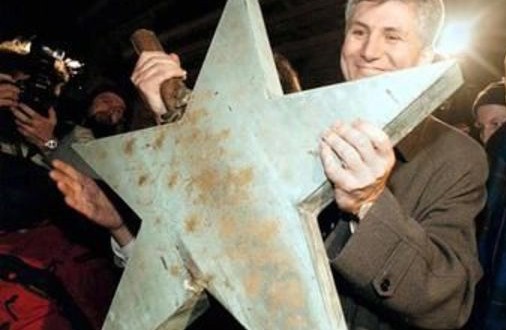
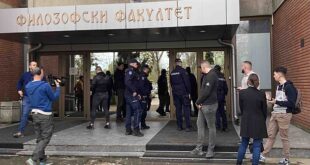
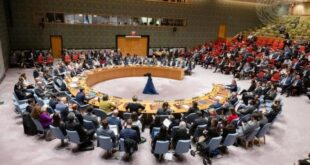
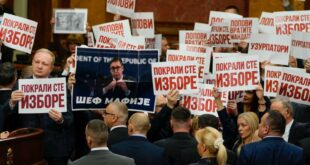
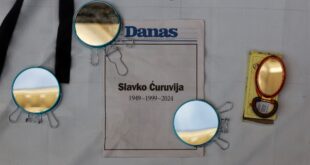
Un commento
Pingback: Tweets that mention Where did our history go? Remembering Zoran Djidjic « EaST Journal -- Topsy.com